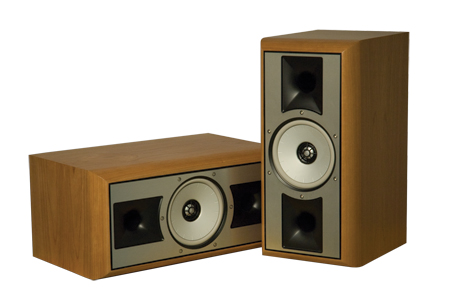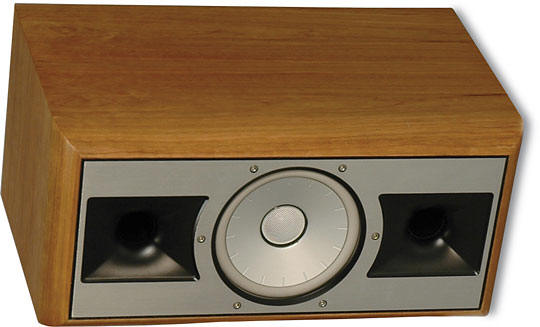|
You are reading the older HTML site Positive Feedback ISSUE 43may/june 2009
The Neoteric Listener...
the Thiel SCS4 loudspeakers
As virtues go, patience is overrated. Slowly cultivating the finer pleasures is all right for some, but give me immediate sensory gratification, and plenty of it. When I throw the switch, I expect hosannas and Valhallas at the speed of house current, served up double hot and toot sweet. Fine for Buddha and Mr. Rodgers to luxuriate in the gradual unfolding of life's revelations, but I've already put on my music-listening fez! One, two, three, fuh! Which brings me to the latest product under review, the Thiel Audio SCS4 loudspeakers. At $1980 a pair, these stand mounts appeal to those who are ready for a serious upgrade from the type of speakers pedaled in warehouse chains and electronics barns, but who haven't discovered, can't afford, or reject as obscene the delightful insanity of the audiophile market. Plenty of kindred listeners in that crowd, so I swept aside my trusty Tannoys, set the SCS4s on the stands, and sat on my overstuffed cushion to act as final judge and arbiter, Grand Turk swayer-of-the-universe-style. But this caliph didn't like it, not at first... or second, for that matter. It's not that the speakers sounded bad, but how should I put it? They squawked at the top and burbled from the bottom, and refused to come out at all in the middle. Of course, I was well aware of Thiel's stellar reputation, in fact, I had eagerly awaited this review pair ever since meeting with Thiel representatives at CES. So, naturally, I suspected that my audio system was choosing this exact moment to mock me in front of my new speaker guests, "Look at you, Mr. PFO, where's your magical musical sorcery, now?" Relying on my considerable expertise, I pulled cables, dusted faceplates, turned the volume both up and down, all to no satisfactory result. True, my editor had forewarned me that Thiel speakers require significant play before they delivered up the goods, but who was I to contend with a pair that played so hard to get? I decided to get some advice from Micah Sheveloff, who had so graciously facilitated this review, and he confirmed that the SCS4s require at least 100 hours of continuous run time. Breaking in is hard to do! Dejected, I shoved aside my newly purchased flapjack pile of CDs, put in Beats Antique's Collide, and cranked up the Thiels. Thus, setting into motion a long and arduous siege....
And nobody had told me that the pursuit of audio enjoyment required more than an electrical outlet and gullible creditors! My previous adventures with audio gewgaws required little more than the ability to follow directions, recline in semi-stupor for extended periods, and scrawl disconcertingly illegible notes. Over time, I began to feel a little smug about my progress in deciphering the talismans of audiophile voodoo. No longer. It seems my editor, Dave Clark, has been doing all the yeoman's work of a real critic, while I had been allowed to flounce around in my motley without even so much as a run in my stocking. In previous reviews, my editor made sure that everything had been specially alchemized, figure-four-leg-locked, and defanged prior to my first encounter. Now it was mano a magneto to see who would win in this battle of man versus machine. I entered the fray, playing full range orchestral music, running speakers out of phase, and pumping up my neoteric neighbors with blistering levels of gypsy electronica. Did I have what it takes to spin The Voices of Living Stereo on endless repeat at door-kicking levels and not return for five, even five-and-a-half hours? You never know much you're willing to annoy others until you're put to the test. And so it went, and so it went, and so it went…! In terms of great waits, I can't say it was Vladimir and Estragon pining eternally for hope in a universe that offers none of it, nor was it Spock's seven year Pon farr abstinence, but it sure was a late-June vigil waiting for the fireworks stand to finally open. Switching out my Nordost speaker cables for Ixos cables helped, but the overall sound stubbornly remained half-frozen food. I almost cut a check to Thiel, telling them that I had broken their speakers, when suddenly… the spring thawed. Most of you are probably saying, "Well, yeah, Skeezix, that's what breaking in speakers is!" but it was a revelation to me, anyway. As if it had been there all along (which, in fact, was the case), all the dissonance, static, and muffling stopped, to be replaced with amazingly precise and coherent sound. Finally, finally, the trills of Kentucky came alive with, well, you know. Playing Pat Metheny's "Bright Size Life," the Thiels delivered all that ridiculous jazzy noodling of the 70's café so well that I yearned for a light tangy salad, accompanied by a coquettish cabernet. Jaco Pastorious's masterful bass playing was tight, tuneful, and weighty, but never bloated. In fact, the precision of the SCS4s is a notable characteristic, and their ability to transmit every musical detail is something that occurs throughout the frequency range. My Tannoys, in contrast, have tendency to color the sound, smoothing out the treble, softening the bass, and accentuating the midrange. It's all very pretty, and works well with the majority of schlock played in my house, but the picture is impressionistic, not photographic.
If you've ever recorded yourself talking, playing the recorder, strumming a ukulele, whatever, you know that it's a pretty grainy, harsh and unpleasant affair (the recording, not your musical genius, naturally). This is why you pay people to doctor up the rough original with all kinds of effects and processing so it sounds tolerable to like-minded friends and indifferent spouses. Add too much, the whole thing sounds like Tammy Faye Baker, too little, it's Maggie May in the morning sun. So where do the SCS4s run, when run in? Really close the source. If you enjoy hearing every note and every beat (and I do) you'll love these speakers. The SCS4s are for those who like the music front and center (figuratively, although the SCS4s deep and marvelous soundstage replicates this position, if the recording features it). Some people may prefer a more "polite" rendition, but I'm the type who enjoys digging into the mix. The sibilance heard on Peggy Lee's "The Boy from Ipanema," for example, is more pronounced through the SCS4s, but so is the timber, warmth, and character of her voice. I'll take that trade off, any day. Nancy Wilson's "A Lot of Living to Do" has a lot going on, musically, and although my Tannoys still produced a fine representation of the stand up bass, piano, and brass section, the Thiels were much better at delineating Wilson's finger-snapping vocal lines. Others, such as the superlative review by the late John Potis in https://positive-feedback.com/Issue36/thiel_scs4.htm may be able to tell exactly what the SCS4s can accomplish in terms of frequency roll off, time alignment, and the like. All I can say is that the Thiels made the music (and the movies, too!) sound more engaging, and more like a real performance (if that's any help). These speakers aren't for putting in the corner and forgetting, they're for turning up and reveling in the moment. Playing Jussi Bjoerling's incomparable rendition of Puccini's "Nessun dorma" through the SCS4s was so thrilling that I just kept playing it over and over, turning it up a little louder each time, until I finally found myself, arms wide open and immersed in the storm. "No one shall sleep" is right! The elegance and subtlety of Andres Segovia's "Siciliana," was an entirely different affair, of course, but the same undiminished clarity of tone and dynamics made me appreciate the SCS4's ability to unearth so much of the music. Going back and forth from the Thiels to my Tannoys, it was obvious how much better the SCS4s were able to convey the vibrato, squeaks, and fret buzz of the classical guitar master's performance. In doing so, every bit of the guitar's resonance, string tone, and fingering techniques were on display in my listening room. It's not all opera at my house (truth be told, classical is usually more affectation than affection with me, but I do enjoy the obvious masterpieces). As good as the Thiels are with the usual audiophile suspects of female pop, Jazz, and Classical (or what I used to think was classical), these little Thiels are tailor-made to rock. Over time, I've learned to appreciate the pleasures of the snifter and vinyl drawing room, where audio purists remove themselves to listen to two mike recordings of marbles dropping on a tuned aluminum sheet… and get a snoot full. Sounds fun to me, but deep down, I know that what I'd really like is to make the music I know well sound better. Which explains why I'm such a sucker for remixed and re-mastered revisions of the staples of my youth. Take David Bowie's re-mastered Hunky Dory album, for example. Placed through the SCS4s, this new hyper-delineated mix stood out in all its hunky glory. Mick Ronson's snarling guitar on "Queen Bitch" never sounded better. The slow panning technique used in the final guitar solo of "Oh! You Pretty Things" perfectly contrasts with Bowie's voice in dead center, and the Thiels expertly illustrated the details of the re-mastered disc. Similarly, the blitzkrieg of notes that characterizes the opening solo (all of his solos, for that matter) of Johnny Winter's "Illustrated Man" blast out of the SCS4s like a roman candle. Um, a roman candle of music, that is, hot and sparkly in a fun but not incendiary way. Charlie Musselwhite's version of "Can't Stay Away" allows the SCS4s to show off one of their greatest strengths, making the music appear "live." Musselwhite's seminal blues harmonica is ear-puckeringly good, as always, but it's the ability of the Thiels to rescue the drums buried in the mix that stand out. What happens to a drum deferred? It's a drag, baby, so it's nice that a pair of relatively inexpensive speakers are able to bring a fullness of sound at such a small price and reasonable size. As the kids say, these speakers put the music "on blast," which means right out in the open. Playing The Crusaders version of "Put it Where You Want It," there was no way you could not stop what you're doing to marvel at the clear, full tone of Wilton Felder's sax. Same thing with the I-cannot-be-ignored immediacy of Anna Nalick's voice on "Wreck of the Day." Put simply, the Thiel SCS4 speakers should appeal to anyone who makes listening to music an event, but probably not to those who desire audio wallpaper. Now that I've sent them back, there's a sense of excitement missing that I know realize was definitely worth the wait…
Thiel
|



